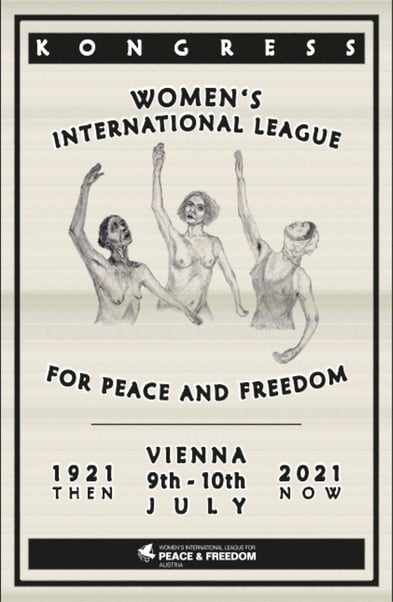We are thrilled to announce that a new member has just joined the fold of our movement: WILPF Austria!
The newly established Group will be celebrating its launch with a special event titled “1921–2021 Women’s International League for Peace and Freedom: Then and NOW!”
The event, which will take place in Vienna from 9–10 July 2021, will coincide with the 100th anniversary of the third WILPF Congress – hosted in Vienna in 1921.
Through various interactive events, the launch will take participants through a stimulating and educational journey, which will start with WILPF Austria’s early-20th century beginnings and end with the Group’s vision and plans for the future. A number of collaborative activities, discussions, and presentations are scheduled throughout the city, and the official Friday launch includes speakers, a film screening, an art exhibition, and live music.
Those interested shouldn’t hesitate to check the event programme and register today! The registration form is available in both English and German. You can also follow the official WILPF Austria Facebook page for up-to-date news and developments.
A Look Back at WILPF in Vienna
The launch of WILPF Austria represents a major milestone in WILPF’s 100-year history of feminist peace activism in the country.
In July 1921, members of 25 WILPF Sections from around the world gathered in Vienna for the third international Congress under the leadership of WILPF’s founding president, Jane Addams.
The Congress resulted in a set of resolutions that included a call to the League of Nations (later replaced by the United Nations) to give direct attention to the situation in the Middle East. The resolutions also included a “Manifesto on Disarmament”, in which delegates addressed the increased military expenditures that followed the First World War – explaining that “universal total disarmament is the only guarantee of international peace.”
These resolutions, along with many others established at the 1921 Congress, remain relevant today and serve as a reminder that while the feminist peace movement has come a long way, many issues persist – as should our activism.
The 1921 Congress was organised by a group of Austrian feminists, including Yella Hertzka – a notable Austrian women’s rights activist who was particularly interested in building, expanding, and maintaining a transnational movement for feminist peace. Hertzka paid special attention to protecting WILPF’s internationalisation and aided in the foundation of WILPF Sections in Ukraine and Serbia. Furthermore, she played a fundamental role in enabling previously unrepresented European and non-European Sections to participate in the Congress.

In 1922, the Austrian Section experienced internal disputes over leadership, and ideological disputes over the internationality of WILPF (with the latter reflecting a wider national discourse on internationalism versus inward-facing nationalism). The disputes ended with a 1934 split into different groups with differing views on pacifism and inter/nationalism. This split was followed by the National Socialist takeover of Austria, which forced several WILPF members to flee to exile – effectively dissolving WILPF Austria.
100 Years Later: Picking Up the Thread
100 years later, WILPF Austria is back!
With an official launch event coming up from 9–10 July, the new iteration of WILPF Austria celebrates WILPF Austria’s historic commitments to transnational dialogue and internationalism, while simultaneously embracing a new kind of feminism: one that is intersectional, multiracial, queer, and environmental. A feminism that transcends borders, and supports the protection of immigrants, refugees, and other people on the move.
By reflecting on the work and priorities of WILPF Austria’s feminist foremothers, the new WILPF Austria will pick up the thread and explore the differences and similarities between the aspirations of WILPF women back then – and the motives and goals of members now.
Get to Know the New WILPF Austria!
If you aren’t able to attend the launch, you can meet some of WILPF Austria’s members right now! In these short video interviews, four founding members of the new Group introduce themselves and talk about what drew them to WILPF.
The Group’s President, Rosa Logar, perfectly sums up the desire to connect past and present: “We want to look at what our sisters did back then: What moved them? What did they do in that very different time? And what moves us today? And where do we pick up the thread again?”

The Group’s communication lead, Ketevan Bakradze, who moved to Austria from Georgia, reflects on the idea of internationalism and how WILPF transcends borders by sharing her own journey of claiming space within the Austrian Group.

The Group’s youngest member, Ida Frantal, reflects on WILPF Austria’s past and explains her personal conception of feminism, perfectly encapsulating WILPF Austria’s contemporary and inclusive trajectory:

And last but not least, the Group’s co-founder, Elisabeth Kapeller, explains what motivated her to join the Group, and what she envisions as the Group’s future priorities:

Elisabeth also designed the launch event’s poster, which takes inspiration from the poster used for the 1921 Congress while adding a more nuanced and representative depiction of feminists in today’s day and age.
Indeed, the new poster is a perfect representation of the new WILPF Austria – a Group that reflects the values of feminism in the 21st century: inclusive, progressive, and rooted in both solidarity and mutual respect.


Left: The original 1921 poster for the third international WILPF Congress.
Right: A 2021 remake of the poster. Designed for WILPF Austria’s relaunch, this poster takes inspiration from the original while adding a modern component that aligns with WILPF Austria’s message and principles.





